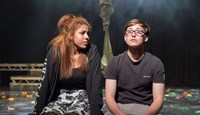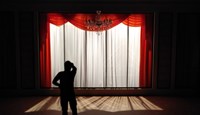- News
- Guest-Blog-The-Trials-Of-Oscar-Wilde
Guest Blog - The Trials of Oscar Wilde

This May, we will welcome back European Arts Company with their latest production, THE TRIALS OF OSCAR WILDE. We chatted to co-writer and producer John O'Connor on the making of this show and how this extraordinary story took its form as a play.
ST: How did ‘The Trials’ come about and how did the production develop from there?
Having directed and occasionally acted in Wilde plays myself (including one memorable occasion when I had to fly to Rome to play Lady Bracknell at 24 hours notice) I thought of myself as a bit of an authority. That was until I showed a Greek friend around London and we stopped at the sculpture of Wilde opposite Charing Cross Station. She asked a deceptively simple question: ‘Why did Wilde go to prison?’
I racked my brains for an easy answer but none was forthcoming. I knew that his imprisonment was due to his sexuality but beyond that I was in the dark. Suitably chastened, I decided to do some digging…
Most of what I discovered shocked and astonished me. For a start, Thursday 14 February 1895 was the triumphant opening night of The Importance of Being and the zenith of Oscar Wilde’s career. Yet within 100 days he found himself disgraced, bankrupted and sentenced to two years hard labour. Was there ever a more dizzying fall from grace outside one of Shakespeare’s tragedies?
It didn’t take a genius to work out that this story would make a great play. I wondered what had actually happened during the trials and what Wilde had said. Was he persecuted or the author of his own downfall? Everyone loves a courtroom drama but this one would feature the wittiest man who ever lived.
I wrote to Merlin Holland who is Wilde’s grandson and the sole executor of his estate. He had written an excellent book called ‘Irish Peacock and Scarlett Marquess’ based on the transcripts of the libel trial that were thought lost but then discovered after 100 years. Merlin also thought this would make a wonderful play and generously offered his time not only to answer my questions but to co-write the script with me.
ST: Persecuted or the author of his own downfall? Or, more simply, the victim of his time? What did his grandson Merlin Holland think?
A bit of both. Wilde started the action for libel after Queensberry left his offensive card at the Albemarle Club. This came after months of threats and pressure from Queensberry so Wilde’s intention was to shut him up. Unfortunately, Queensberry had had private detectives trawling the homosexual underworld looking for evidence of wrongdoing. Once Wilde opened the legal case, the tables were quickly turned and Queensberry had various rent boys waiting in the wings to give evidence. This left Wilde no choice but to drop the case. He was arrested the same day which was incredibly quick and put through two criminal trials in the space of a month. At the first one, the jury couldn’t reach a verdict so they tried him again almost immediately and this time they wheeled out the Solicitor General to lead the prosecution case.
It seems the whole might of the British Establishment was directed against Wilde and, on fairly flimsy evidence, he was given the maximum sentence allowed at the time – two years imprisonment with hard labour. The presiding judge called the sentence ‘totally inadequate’ and said it was ‘the worst case he had ever tried’. This despite having presided over rape and murder cases in the past! There is no doubt that Wilde set the wheels of his downfall in motion but it is still shocking to see just how harshly he was punished for what amounted to consensual sex.
ST: As with other ‘political’ shows at Stantonbury Theatre in the last year or so, does this one have immediate sympathy from the audience so long after the event or is it more complex?
Unlike other writers of the 19th Century, Oscar Wilde seems to have become more relevant as time has gone on. His plays are always in fashion and there are countless biographies, films and documentaries about him. Social media is full of Wildean quotes which fit neatly into 280 characters and his image is now on t-shirts and posters, like Che Guevara or James Dean. We feel as though we know him but what’s fascinating about this play is that we can hear his actual words spoken under pressure and off the cuff. We tend to think of Wilde speaking in perfectly constructed epigrams with total assurance but in court we hear him completely unguarded and vulnerable. He stumbles and evades but also surprises us with flashes of lightning wit and defiance. This is the closest thing to seeing him in the flesh or being in the gallery at the Old Bailey.
As for the relevance of the case today, it’s very important to remember that in 2019 artists and writers are still being imprisoned or killed throughout the world for being thorns in the side of the establishment. Despite major advances in the rights of LGBT people in the UK, according to the charity Stonewall, same sex relationships are still illegal in 72 countries and in 8 of those they are punishable by death.
ST: Is there more than just verbatim accounts of the trials – modern opinions, for example? – or does it leave audiences to form their own opinions about Wilde, the laws of the day and in particular the role of the Lord Chancellor?
Wherever possible, we have used the original words spoken in court. The first half of the play deals with the dramatic events of the libel trial – Wilde vs Queensberry – as Oscar goes from Prosecutor to Prosecuted in the space of three devastating days. The second half carefully reconstructs the criminal trial - ‘Regina vs Wilde’ - from newspaper reports, eyewitness accounts and documentary evidence.
In this production, the audience is addressed as though it were the jury. This helps them to become involved in the case and to weigh up the evidence for themselves. It should give them a fresh insight into the flawed and complex genius of Oscar Wilde. And it will raise some questions in their minds about the role of the Establishment in bringing Wilde down. As he said himself, ‘the truth is rarely pure and never simple’.
The Trials of Oscar Wilde plays at Stantonbury Theatre on 15 May. Book your tickets [here].








Conversations